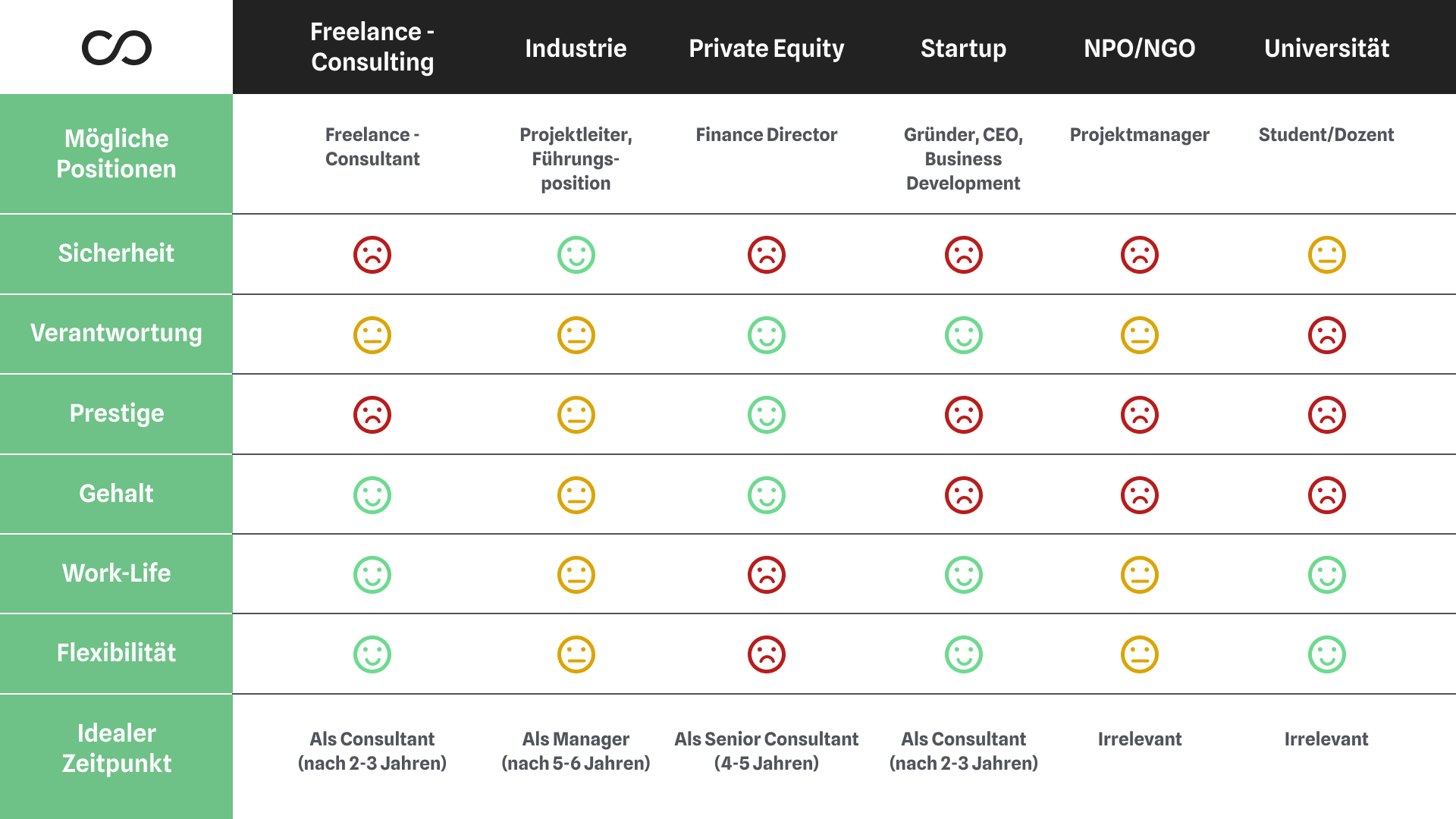Regular headhunter inquiries and job offers via Xing or LinkedIn are part of everyday life for you as a top consultant. After all, you have developed the most important skills that are in demand in almost every company in a wide-ranging job in consulting. You are self-confident, communicative, analytically strong and can solve business problems with ease. This means that the professional world is also open to you for your next career steps.
However, with the seemingly unlimited opportunities after the consulting exit, the selection paradox quickly arises. After all, too many options overwhelm and hinder decision-making – even in the job search. On the one hand, you don’t want to miss out on an important career opportunity. On the other hand, you have to make a decision and ask yourself the question:
“What is the perfect next career move for me?”
Career after consulting
In theory, you have all the necessary skills to successfully climb various career ladders after you leave the company. the reality check shows: The exit is not quite as easy as we thought. It depends on many factors.
The most important factors are your overall profile, your previous projects and your customers. Is a customer convinced of you and now wants to poach you? Did you get an insight into different industries? Or were you able to focus on one industry and develop a specific expertise in a particular area? For example, if you have in-depth knowledge of digital topics such as cloud, big data or analytics, you will be right in line with the times and will be able to support many companies in the course of digitalization.
Previous employers also play a role in your professional future. But be careful: Our many years of experience in recruiting confirm that McKinsey, BCG or Bain references in a resume are no longer a universal ticket to every dream job at the company of your choice. Although the often very good alumni networks of top consultancies can bring many advantages, not every company rolls out the red carpet for the ex-MBBer. The negative stereotype of “aloof strategy consultants without relevant operational experience” unfortunately persists.
These exit options await you after leaving consulting
Which option is exactly right for you depends not only on your skills, but above all on your personal preferences. That’s why it’s important to be aware of what exactly you want: Do you feel like taking on more responsibility at work or investing equity? Do you dream of a better work-life balance? What are you willing to take a pay cut for?
Do you basically enjoy your work, but wish you had more control over your projects, work hours, and the nature of your job? If you don’t attach much importance to partner titles or a permanent position, working as a freelance consultant after your consulting exit is just the right thing for you.
The widespread desire for self-determined work has led to a kind of upheaval in the professional world in recent years. The consulting industry is also affected by this. Whereas twenty years ago only the “old hands” with strong networks were able to get by as freelancers, today there are mediation platforms such as consultingheads, which bring companies and freelance consultants together conveniently and efficiently. This way, even as a young consultant with suitable expertise, you will regularly manage to get suitable clients and interesting projects.
Not only will you have financial security, but you’ll also earn a lot more than you would at a top consulting firm. Because thanks to the higher hourly wage and the low levies for overhead costs, you are left with a salary that is quite respectable. We have already seen our freelance users increase their salary by 100%!
Change from consulting directly to industry
The dream of many consultants is to move directly into a management position in industry. Oliver Bäte worked for McKinsey for 14 years at various levels and moved to the Allianz Board of Management at the age of 42. But companies often prefer to promote their own junior staff rather than hire external talent. That’s why, as a consultant in industry, you usually first have to prove yourself as a project manager before you can move up to a management position. This means less salary and requires a lot of perseverance. In medium-sized companies, however, you may be able to move directly into management with at least one year of management experience.
Especially when leaving the industry, the earlier you start planning, the better. As soon as you enter consulting, you can choose employers with your desired exit industry in mind. Then it’s about building relationships. Above all, regular contact with customers is important, because you can be recruited directly from them into a managerial position, which may even involve a jump in salary.
Consulting Exit Private Equity/Venture Capital
In venture capital, you change industries but remain a consultant in a similar work environment. This means that you can expect an equally stressful and turbulent everyday life. From a financial point of view, however, private equity is the best exit option and therefore highly sought-after among consultants. You earn better than in consulting and are rewarded with even more prestige. You’ll also get the chance to make big deals and even change entire industries. For many ambitious consultants, this is the perfect choice.
But joining a PE firm will be difficult without a background in investment banking. With MBB reference in your resume and the corresponding connections, you may be able to keep up with the strong IB competition. Otherwise, you need to have at least an internship at a bank or some projects with a focus on corporate finance in order to be invited to the interview. Ideally, you will be moving from a position as a senior consultant or young project manager, i.e. when you are still working as closely as possible to the industry.
Finding dynamism in young start-ups
Working independently and founding one’s own company has become the dream of many consultants. With the experience knowledge and the right business idea you have as a consultant everything you need for the successful start-up. If you are aiming for this exit in the long term, you can already put aside the necessary cash cushion for financing your later business during your consultant career. You should also take the opportunity to build up connections to investors at an early stage.
If you don’t have your own business idea, but want to work in a young and dynamic environment, you can also join an existing start-up. There you will mostly be considered for CEO or business development positions. However, it is best to make the switch before you have become accustomed to the higher consulting salary. Because while young startups advertise fun, cool teams and fun events, there’s one thing they often can’t offer you: a high salary. However, if you receive shares, it may be even more profitable. Because depending on the success, the business can be worth a lot one day.
Non profit consultant
Maybe you’re fed up after years of working entirely for profit. You enjoy your job, but yearn to use your skills to solve problems that are more important globally. Then large nonprofits that are looking for support in strategy issues and the areas of international development or project management come into question for you. But value-based work comes at a price: lower pay, long hours and sometimes even dangerous locations.
A rather unusual exit in Germany is to move into government positions – either directly or with an intermediate stop in an NPO that has contacts to the public sector. Here, too, you have to make sacrifices in terms of salary, working hours and career prospects.
After university is before university
To quench your thirst for knowledge and increase your own market value, MBA studies or a doctorate is the ideal choice. Studying after your consulting exit offers you the opportunity to take a short educational break during which you can reorient yourself. In addition, further study increases your chances of a stellar career in another industry.
Furthermore, another option of an academic nature is teaching itself. As a consultant, you have excellent communication skills and are practiced in explaining issues in a concise and understandable manner. This makes you the ideal college professor. You are especially welcome at universities of applied sciences, since the lecturers there always have to have a certain amount of work experience. In this exit, timing does not matter. Some consultants fulfill a lifelong dream with a professorship, often even at an advanced age.
Good prospects for consultants
Even if the situation for former consultants in some areas no longer looks quite as rosy as it did 20 years ago, you still have countless options if you decide to leave. Because your skills as a consultant remain highly valued in every type of company – from a start-up to a DAX company to a non-profit organization. If you know exactly what you want and plan your exit early, you have a good chance of achieving your goals.
Sources
Allianz: “Members of the Board of Management” Accessed at: https://www.allianz.com/de/ueber-uns/unternehmensfuehrung/vorstand/mitglieder.html
Become part of our community for the most exciting freelance projects
You are a consultant and already want to look for concrete jobs that could be suitable for you after your exit? Then register with consultingheads – free of charge and confidentially. Whether you are looking for a full-time or freelance job, we have exclusive job offers tailored to your needs!









